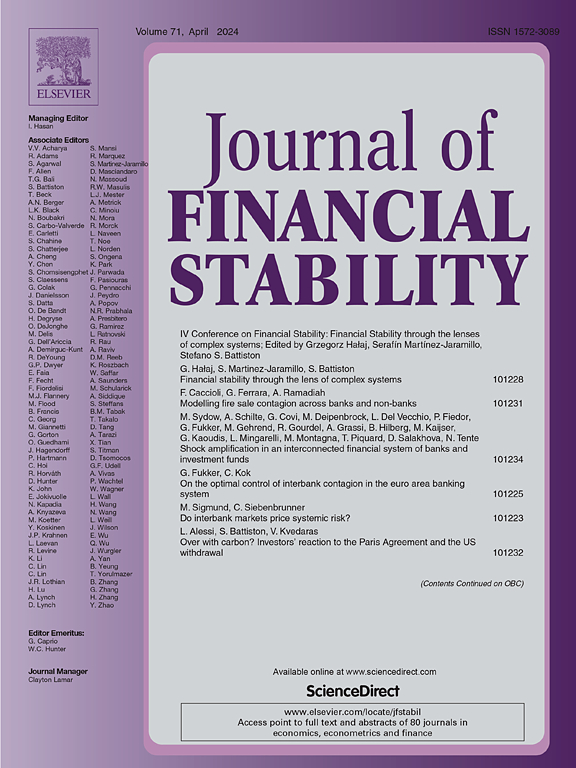The impact of country- and firm-level governance on capital allocation efficiency: New evidence from India
IF 6.1
2区 经济学
Q1 BUSINESS, FINANCE
引用次数: 0
Abstract
This paper investigates the impact of country-level governance on corporate investment efficiency using data from Indian-listed firms between 2009 and 2022. Additionally, we explore how country-level governance interacts with firm-level corporate governance to influence investment inefficiency. Using World Bank's worldwide governance indicators, our findings from panel econometric models reveal that country-level governance and its subcomponents (political stability, government effectiveness, regulatory quality, rule of law, control of corruption, and voice and accountability) negatively affect investment inefficiency, underinvestment, and overinvestment. This suggests that robust governance at country-level serves as a control mechanism, reducing companies' likelihood of investing above or below optimal levels. Furthermore, we find that the effect of firm-level corporate governance (measured using a newly constructed governance index) on investment inefficiency is more pronounced in weak country-level governance environments, indicating a substitutive relationship. Similar patterns are observed in overinvestment and underinvestment scenarios. This evidence implies that when country-level governance is inadequate in mitigating agency conflicts and information asymmetries, firm-level corporate governance mechanisms become crucial for promoting investment efficiency. The robustness of our results is ensured through various methodological approaches. Sample selection bias is addressed using entropy balancing, while endogeneity concerns are mitigated with a combination of two-stage least squares, firm fixed effects, and a two-step generalized method of moments. Additionally, our findings remain consistent when using different proxies for both dependent and independent variables. Our empirical investigation provides valuable insights for regulators, policymakers, and corporate stakeholders in developing efficient investment policies.
国家和公司层面的治理对资本配置效率的影响:来自印度的新证据
本文利用2009 - 2022年印度上市公司的数据,研究了国家层面的治理对公司投资效率的影响。此外,我们还探讨了国家层面的治理如何与公司层面的公司治理相互作用,从而影响投资效率低下。利用世界银行的全球治理指标,我们从面板计量模型中得出的结论表明,国家层面的治理及其组成部分(政治稳定性、政府有效性、监管质量、法治、腐败控制、话语权和问责制)对投资效率低下、投资不足和过度投资产生了负面影响。这表明,国家层面的健全治理可以作为一种控制机制,降低公司投资高于或低于最佳水平的可能性。此外,我们发现,在较弱的国家治理环境中,公司级公司治理(使用新构建的治理指数衡量)对投资效率低下的影响更为明显,表明存在替代关系。在过度投资和投资不足的情况下也观察到类似的模式。这一证据表明,当国家一级的治理不足以缓解机构冲突和信息不对称时,公司一级的公司治理机制对提高投资效率至关重要。我们的结果的稳健性是通过各种方法方法来保证的。使用熵平衡来解决样本选择偏差,而通过两阶段最小二乘法,固定效应和两步广义矩法的组合来减轻内质性问题。此外,当我们使用不同的代理来代表因变量和自变量时,我们的发现是一致的。我们的实证研究为监管者、政策制定者和企业利益相关者制定有效的投资政策提供了宝贵的见解。
本文章由计算机程序翻译,如有差异,请以英文原文为准。
求助全文
约1分钟内获得全文
求助全文
来源期刊

Journal of Financial Stability
Multiple-
CiteScore
7.70
自引率
9.30%
发文量
78
审稿时长
34 days
期刊介绍:
The Journal of Financial Stability provides an international forum for rigorous theoretical and empirical macro and micro economic and financial analysis of the causes, management, resolution and preventions of financial crises, including banking, securities market, payments and currency crises. The primary focus is on applied research that would be useful in affecting public policy with respect to financial stability. Thus, the Journal seeks to promote interaction among researchers, policy-makers and practitioners to identify potential risks to financial stability and develop means for preventing, mitigating or managing these risks both within and across countries.
 求助内容:
求助内容: 应助结果提醒方式:
应助结果提醒方式:


